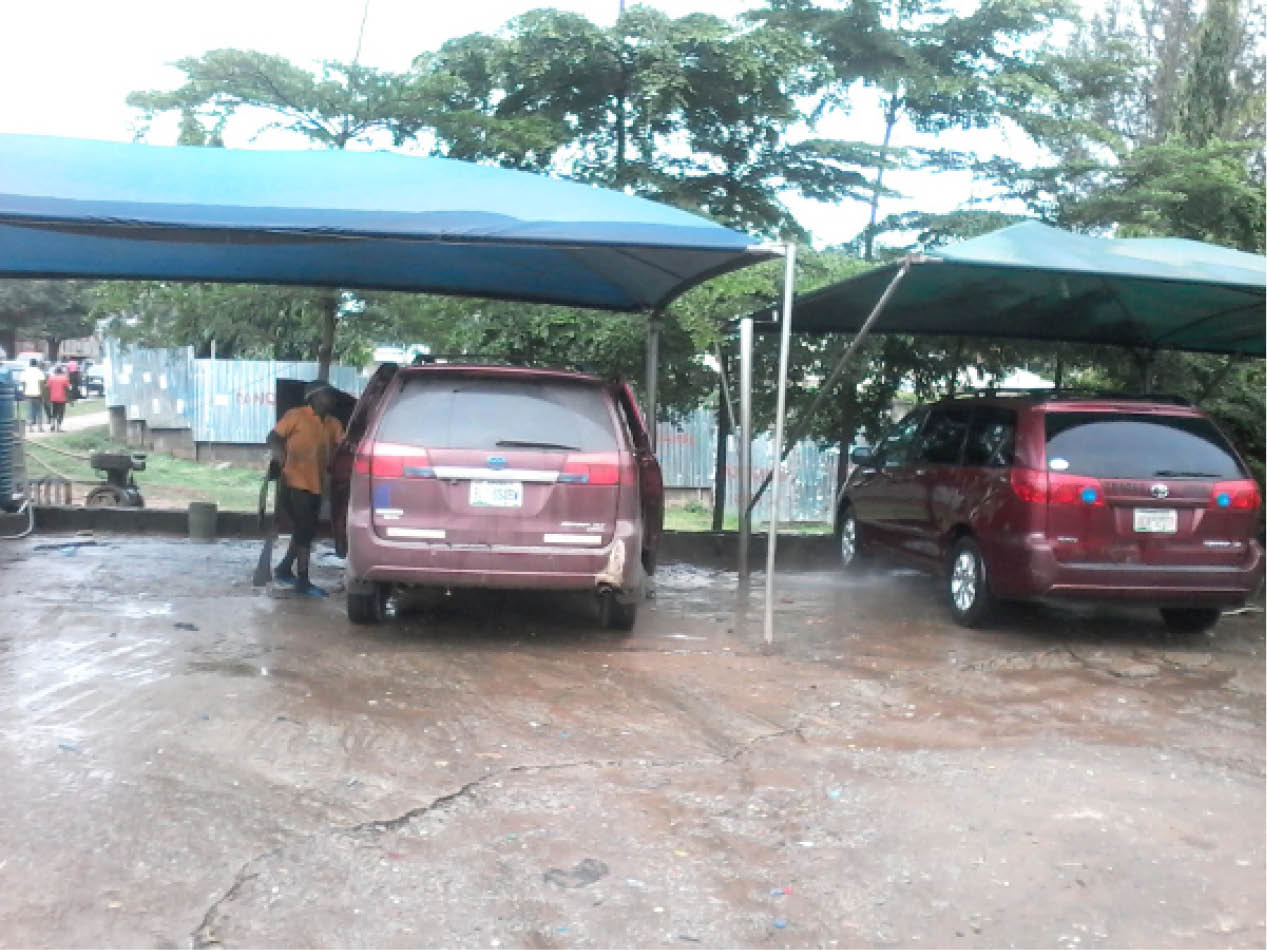They wash cars, and it has become more than just a means to earn a living. It has saved them from themselves.
These ‘car wash men’ come from different parts of the country with hope in their hearts and hands ready to toil. But this hope is sometimes dashed. Jobs don’t grow on trees they soon find out, especially not when you don’t have an education. Graduates are everywhere too, roaming the streets with files containing photocopied documents. Does a secondary school certificate holder stand a chance?
Reuben Eje, a secondary school leaver from Kogi State, was speeding on his motorcycle several years before he had an accident. Picking up passengers on his motorcycle was how he had survived since he stepped foot in the capital city in 2010. He worked many hours, eager to make more and more money. The sooner he dropped off one and picked another passenger, the better for him. It’s just the way things work for them. A motorcycle finds it easy to meander through traffic, especially around Mararaba and Nyanya.
But suddenly, like most tragedies, the accident happened without warning and Eje had to look elsewhere. This was when a relative suggested he start washing cars, and he agreed, after all, the memory of having lost some of his teeth was still fresh in his mind -better a washman with less risk than a rider.
This turned out to be one of the best decisions Eje has ever made. His new work started slow, then picked up. In Utako, where he washes cars by the roadside, he is his own boss and washes as many as thirty vehicles in a day, each putting an average of N500 in his pocket. This didn’t all happen without a reason. He has earned the trust and support of many customers, including taxi drivers and private car owners. Sometimes, his customers give him as much as N1000 for a job well done. Life at the moment is good. Somehow, he has found a way out of the tragedy that befell him in the city. Today, he is married with three children. But, “My dream is to become a driver. It has more prestige,” he said.
In another part of Utako, Eric Ukor makes a living washing vehicles too. But this wasn’t the plan when he came to Abuja. A welder, he did his apprenticeship in Makurdi, Benue State and believed the capital city would provide him with many opportunities.
“But this wasn’t the case,” he said. “When I came, I started work with some people, thinking I could earn a living from it. Unfortunately, the work wasn’t regular.”
So Ukor scouted around for cleaning jobs in offices without success. This was when he chanced upon men washing cars, and interestingly, they were from his hometown. Now, he welds when a job comes and washes cars most of the time.
“The work pays,” Ukor said, adding that the Abuja Environmental Protection Board (AEPB) task force is their only challenge. “The least we pay to be released is N5000.”
Ukor pointed out that the government should provide opportunities for people like them if they don’t want them to continue what they are doing. “I’m not a lawyer, but I know that for any law that doesn’t enjoy compliance, a way out is needed to favour both parties. Since 2012, AEPB have been chasing us away and we are still here. If 20 people are chased away, what are they expected to do? It is another way of encouraging terrorism and theft.”
Once a voracious reader, Ukor said he doesn’t have the time now. He, however, looks forward to going back to school and studying Mechanical Engineering.
Where Ukor works, their numbers have grown to 20 men, all from Benue State. The youngest among them is Desmond Iorkyaa, 21, who joined the group just about a year ago. Iorkyaa, 21, left his village for Abuja, but still dreams of becoming a lawyer. “I want to make up for my dad’s crushed career,” he said. Apparently, Iorkyaa’s father was once a lawyer, but was dismissed.
Close to where the ‘Benue boys’ work is an abandoned construction site. This was what brought one of them, Michael Ochi, to Abuja. It was a huge project, a five-storey building, so he was positive it was worth it if he left his comfort zone. Unfortunately, after being raised to a certain height, the building was abandoned. Distraught, Ochi looked around him and soon settled for washing cars on the street.
As early as 4’o’clock in the morning Ochi leaves Karkuchi, where he resides, and makes his way to Utako. There, car hire drivers bring their cars to be washed so they can get to work at dawn.
“We charge regular customers N500 and as much as N2,000 for a more thorough wash,” he said.
But not every car wash business is run by men like Eje, Ukor, Iorkyaa, and Ochi. Ugo Udeh is manager of a well-established car wash close to Utako Motor Park, popularly called Jabi Park. He was an ordinary worker years ago before the owner elevated him to the post of manager. A stone throw away from his work place are several transport companies. Because of them, they close as late as 10pm. “Some of them come back from a journey and bring their buses,” he explained, adding that his workers get N200 from a regular car wash worth N500, while he pockets N300. “We are doing well,” he said.

 Join Daily Trust WhatsApp Community For Quick Access To News and Happenings Around You.
Join Daily Trust WhatsApp Community For Quick Access To News and Happenings Around You.



